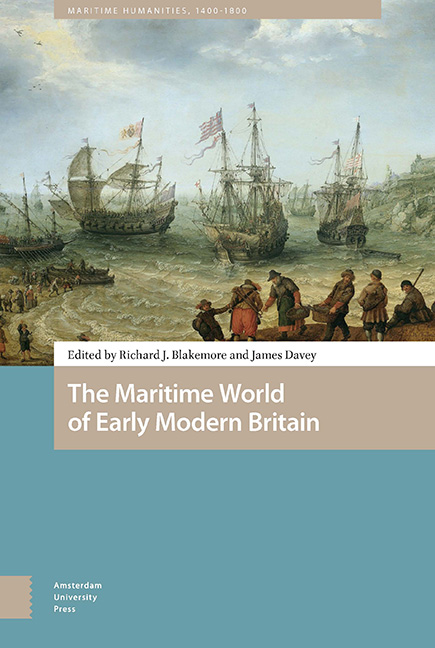Book contents
- Frontmatter
- Contents
- List of illustartions
- Acknowledgements
- Note on Conventions and Terminology
- Introduction
- 1 The Minion and Its Travels: Sailing to Guinea in the Sixteenth Century
- 2 Commanding the World Itself : Sir Walter Ralegh, La Popelinière, and the Huguenot Influence on Early English Sea Power
- 3 An Investigation of the Size and Geographical Distribution of the English, Welsh, and Channel Islands Merchant Fleet: A Case Study of 1571–72
- 4 An Evaluation of Scottish Trade with Iberia during the Anglo-Spanish War, 1585-1604
- 5 Performing ‘Water’ Ralegh : The Cultural Politics of Sea Captains in Late Elizabethan and Jacobean Drama
- 6 ‘Wicked Actions Merit Fearful Judgments’ : Capital Trials aboard the Early East India Company Voyages
- 7 A water bawdy house’: Women and the Navy in the British Civil Wars
- 8 ‘Thy sceptre to a trident change / And straight , unruly seas thou canst command’: Contemporary Representations of King Charles I and the Ship Money Fleets within the Cultural Imagination of Caroline England
- 9 ‘Proud Symbols of the Prospering Rural Seamen’ : Scottish Church Ship Models and the Shipmaster’s Societies of North East Scotland in the Late 17th Century
- 10 Systematizing the Sea : Knowledge, Power and Maritime Sovereignty in Late Seventeenth-Century Science
- Select Bibliography
- About the Contributors
- Index
3 - An Investigation of the Size and Geographical Distribution of the English, Welsh, and Channel Islands Merchant Fleet: A Case Study of 1571–72
Published online by Cambridge University Press: 21 November 2020
- Frontmatter
- Contents
- List of illustartions
- Acknowledgements
- Note on Conventions and Terminology
- Introduction
- 1 The Minion and Its Travels: Sailing to Guinea in the Sixteenth Century
- 2 Commanding the World Itself : Sir Walter Ralegh, La Popelinière, and the Huguenot Influence on Early English Sea Power
- 3 An Investigation of the Size and Geographical Distribution of the English, Welsh, and Channel Islands Merchant Fleet: A Case Study of 1571–72
- 4 An Evaluation of Scottish Trade with Iberia during the Anglo-Spanish War, 1585-1604
- 5 Performing ‘Water’ Ralegh : The Cultural Politics of Sea Captains in Late Elizabethan and Jacobean Drama
- 6 ‘Wicked Actions Merit Fearful Judgments’ : Capital Trials aboard the Early East India Company Voyages
- 7 A water bawdy house’: Women and the Navy in the British Civil Wars
- 8 ‘Thy sceptre to a trident change / And straight , unruly seas thou canst command’: Contemporary Representations of King Charles I and the Ship Money Fleets within the Cultural Imagination of Caroline England
- 9 ‘Proud Symbols of the Prospering Rural Seamen’ : Scottish Church Ship Models and the Shipmaster’s Societies of North East Scotland in the Late 17th Century
- 10 Systematizing the Sea : Knowledge, Power and Maritime Sovereignty in Late Seventeenth-Century Science
- Select Bibliography
- About the Contributors
- Index
Summary
The study of the sixteenth-century merchant fleet of England, Wales, and the Channel Islands is a neglected area of research in comparison to the volume of work undertaken into trade, the development of the Royal Navy, the age of exploration, privateering, great personalities, ship design, and naval warfare. The only major book-length study of English merchant shipping in this period – focusing upon the ships themselves rather than trade routes, commodities, and mercantile communities – is Dorothy Burwash's English Merchant Shipping, 1460-1540, which is now over seventy years old, and research into Welsh and Channel Islands shipping is similarly scant.2 This lack of research into the size and geographical distribution of the merchant fleet is unfortunate, because shipping was central to the economic lifeblood of the nation. Goods were imported and exported to and from Europe (and increasingly as the sixteenth century progressed from further afield), and whilst foreign shipping contributed to this overseas trade, by the sixteenth century at least it was indigenous shipping which bore the brunt of this mercantile activity in most ports. Merchant vessels were also essential to native trade, moving commodities coastwise and navigating the extensive Anglo-Welsh riverine networks to transport goods to and from hundreds of settlements both on the coast and much further inland. Fishing vessels, which were also employed as trading vessels on occasion, were also an essential part of the economy.
What is more, these vessels were of considerable political interest. The English Crown (which had suzerainty over Wales and the Channel Islands) had the prerogative right to tax overseas trade (imports and exports) on certain commodities carried in both native and foreign vessels, and the government thus had a vested financial interest in monitoring the activities of the merchant fleet. In short, an understanding of the merchant fleet of England, Wales, and the Channel Islands opens an important window into the country's economy. The Crown was also interested in the size and tonnage of the fleet because it was able to requisition or hire merchantmen for naval duties: knowing how many ships existed, how large they were, and where they were located (their home ports) was vital information.
- Type
- Chapter
- Information
- Maritime World of Early Modern Britain , pp. 81 - 104Publisher: Amsterdam University PressPrint publication year: 2020



